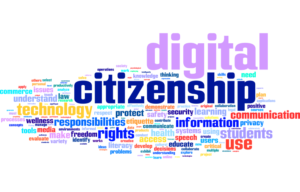Digital Citizenship (DC) is a hallmark characteristic of modern life. In the Digital Learning and Leading program the emphasis has been on cultivating and guiding educational leaders to develop ways and means of implementing life-long practices for learners in their instructional domains.
Development
All students and people today live in a world that influenced to some degree by digital information. Even in Third World countries or economically disadvantaged areas, access to the digital world is a part of a learner’s life, albeit maybe in limited means (Christensen 2011).
However, the emphasis of the DLL program has been to develop learning and instruction in more conventional settings as they apply to the individual students in the program.
The focus for me has been the development of an Innovation Plan (IP) for the University Press that includes the formal implementation of ePortfolios as a means of tracking student achievement and creating an academic and professional identity. A secondary consideration is to document the culture of learning and achievement of UP students through process and practices (Sonderman, Rosenstiel, 2015).
A part of the culture of process and practices is the development of student journalists to create through participation their digital identity. DC is an identity that is created through intentional and unintentional actions by students (Ohler, 2012). DC is often a subtle creation that for many students begins as soon as they start engaging in digital media, whether it is the creation of their first social media or email account.
Students are creating other digital accounts at very young ages. For example, accessing iTunes to purchase entertainment media or streaming video services like Netflix or gaming sites like Steam.
The UP IP, calls for students to, at the minimum, have the compulsory Lamar email account and BlackBoard access, a Facebook account and preferably a Google Gmail account. For the portfolio, the emphasis has not been on the technology, but the process for creating a repository for learning and professional artifacts. For the UP IP, it is encouraged that learners start with a free WordPress or Google account. Learners are free to use whatever platform they choose as long as it is accessible and is capable of hosting the artifacts created throughout their tenure with the UP – written articles, photo posting of standalone, galleries or slideshows, document postings in Word or PDF formats and video clip shorts or packages.
As learners progress through their degree program and approach graduation, they are encouraged to acquire and purchase a unique and personal domain and hosted web site.
The DLL program has provided the structure to conduct research, get feedback from peers also in the program and the means to revisit and revise as learners proceed through each course in sequence.
Through each step, for learners at the UP, of creating their ePortfolio we implemented many of the concepts related now in the EDLD 5316 course, while not exact at the time of implementation, the elements followed the general concepts.
Ribbles’ Nine Elements of Digital Citizenship (2015) is something I had discovered earlier in the program during research, but I have not formally incorporated them into the IP until now. Along with Ribbles, many concepts from 5316 not only apply to student learners, but will apply to the instructional development and professional learning of the IP.
Conclusion
For the UP IP, significant components of EDLD 5316 materials can be added to plan as specific and formal research supporting the plan.
For this student, with almost every course of the DLL program, it has coincided with what was occurring with the IP. It has, at times, created the feeling of a teacher staying one chapter ahead of the class they are teaching.
DC is a component that needs to be included for students, but also for instructors.
References
Christensen C. M., & H. J. Eyring. (2011). The innovative university: changing the DNA of higher education from the inside out. San Francisco: Jossey-Bass. ISBN 1118063481.
Ohler, J. (2012). Digital citizenship means character education for the digital age. Education Digest: Essential Readings Condensed for Quick Review, 77(8), 14-17. (PDF: Ohler_Digital_citizenship_means_character_education_2012.pdf)
Ribble, M. (2015). Digital citizenship in schools: Nine elements all students should know (3rd ed.). Eugene, OR: International Society for Technology in Education
Sonderman, J. & Rosenstiel, T. (2015). “A culture-based strategy for creating innovation in news organizations.” Published May 27, 2015, American Press Institute. https://americanpressinstitute.org/publications/reports/white-papers/culture-based-innovation/single-page. Retrieved February 2, 2017 from https://americanpressinstitute.org/publications/reports/white-papers/culture-based-innovation/single-page


